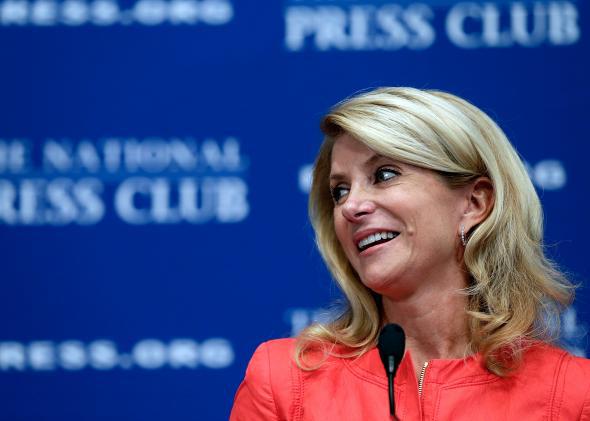One positive result of the Lean In era is that, as a culture, we’re more aware of the behavioral tightrope women have to walk to advance in their chosen fields. It’s become such a well-known trope that NPR published a terrific humor piece Tuesday telling female hurricanes that they need to “stop acting so blustery” if they want to be taken seriously. So it should come as no surprise that women running for office are held to different standards of behavior than men running for office and that they’re dinged more for perceived mistakes. That’s one of the findings from a new report from the nonpartisan Barbara Lee Family Foundation called “Keys to Elected Office: The Essential Guide for Women.”
The data in the report was gathered from the campaigns of every woman who has run for governor in the past 15 years. The BLFF polled voters along with candidates and campaign staff. They found that likability and qualifications are more closely linked with female candidates than with male candidates. As the study puts it, “For women candidates, not making a mistake is part of being likeable. For men candidates, not making a mistake is part of being organized and getting results.” This plays out in several ways on the campaign trail.
For example, female candidates are judged more harshly for going negative in campaign ads, even though showing how you’re different from your opponent is a necessary aspect of any successful campaign. What’s especially troubling is that women in particular judged female candidates for going negative, because they hold their fellow women to a higher standard. “I expect more from a woman [candidate] than I do a man, because it used to be a man’s world and they always bashed, and I think a woman can have more tactfulness to not stoop to a man’s level,” said one woman in a focus group. Other women judged female candidates for their lack of “femininity” and compassion when they went negative. Per another focus group member: “I just wanted to comment on the ads from the female politicians; to me they seemed a little masculine. They didn’t look soft or feminine.”
As we’ve seen in Texas gubernatorial hopeful Wendy Davis’s campaign, family is also a complicated issue for female candidates. If you’ll recall, there was a controversy over how much time Davis did or did not spend with her daughters while she was attending law school at Harvard. “While being a mother is appealing to voters, it also reinforces gender stereotypes,” the study notes. “Voters express anxiety about a woman’s job in office taking a backseat to her role at home and wonder who is taking care of the children, if they are young.”
In terms of their abilities, women must do more to prove that they are qualified on economic issues than their male counterparts. According to the study:
Voters want to see specific financial, crisis management, and political credentials when evaluating whether a woman could handle the complexities of running a state. For instance, voters surveyed felt more confident in a candidate who had been a state treasurer when they were told that as treasurer she got the state out of debt than they were in a candidate who did not mention her accomplishments as treasurer. In contrast, men were assumed to be qualified to lead their state if they had a resume that simply listed positions of leadership and service. Women must show, where men can tell.
Even some advantages can be a double-edged sword for female candidates. In general, voters do think that female candidates are more honest and ethical than male candidates. But if voters believe that a female candidate has acted dishonestly, she is punished more for that mistake than a male candidate would be. Again, see Davis, who was the object of national scorn for allegedly fudging details of her biography because her official materials talk about how she was a poor single mother, but she was only a poor single mother for a little while. “A woman candidate who falls off her political pedestal pays a high price in the loss of voter esteem, especially among women voters who expect a woman to be different,” the study points out.
It’s not all bad news. Voters think that female candidates are better than male candidates at working across party lines, having the right priorities, solving problems, and representing voter interests. Female Democrats have particular advantages because voters believe that female politicians will do a better job protecting access to birth control and contraception, keeping entitlements, and supporting education. Now, as long as they’re dressed in just the right way (women’s appearances are under a microscope, the study notes, so try a colorful jacket over a sheath dress!), they may be able to use those built-in advantages to win statewide elections.
